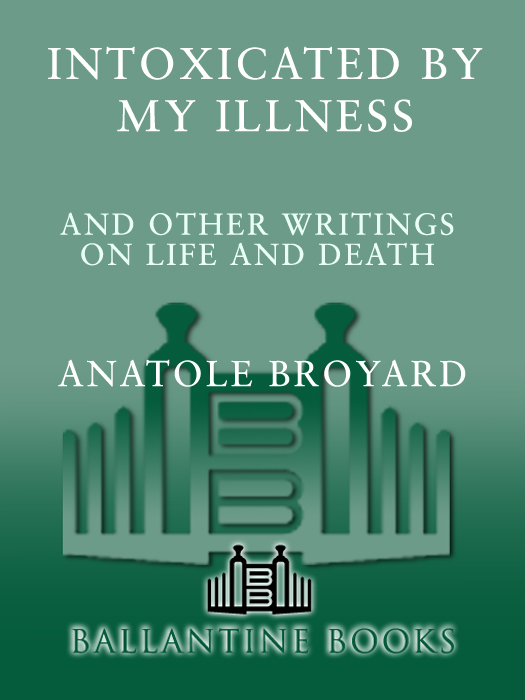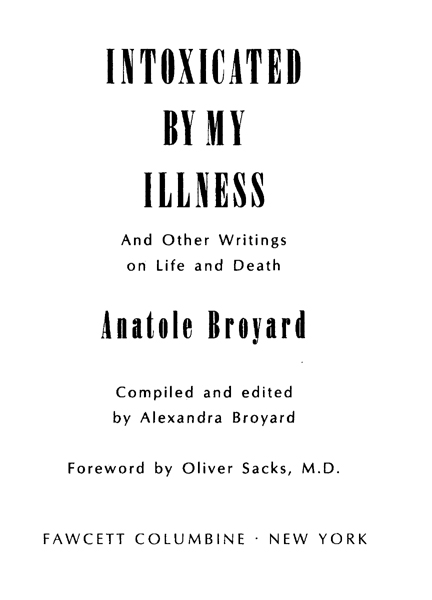Witty, Vibrant, and Life-Affirming
Irony and attitude bubble up immediately like vintage champagne. Intoxicated By My Illness deserves a prominent place on the same shelf housing Broyards favorite works.
The Boston Globe
In this book I found the wisdom, feelings, and basic truths that help all of us to deal with lifes afflictions. Broyard helps us understand that life is conquered by confronting the demons, afflictions and adverse events that we all face and becoming the hero of our own story.
Bernie Siegel
Death lingered coyly at Anatole Broyards elbow all his life, but the pair never flirted until docs told him he was dying of prostrate cancer. Intoxicated By My Illness is a collection of his startling and often hilariously funny thoughts on the whole dying shtick. His mood is never morbid or angry, but buoyant, curious, almost eager for the final adventure.
The Atlanta Journal & Constitution
Remarkable and moving. Broyards bravery and intelligence are both on display in this most unusual and wonderful book.
Newark Star-Ledger
Nothing could be more personal, more frightening, more unsettling, or more useful.
Harold Brodkey
A jewel of a book. It has wit and humor along with the capacity to reach to the depths. Intoxicated By My Illness has all the makings of an enduring classic.
New York Post
A Fawcett Columbine Book
Published by Ballantine Books
Copyright 1992 by the Estate of Anatole Broyard
All rights reserved under International and Pan-American Copyright Conventions. No part of this book may be reproduced or transmitted in any form or by any means, electronic or mechanical, including photocopying, recording, or by any information storage and retrieval system, without permission in writing from the publisher. Published in the United States by Ballantine Books, a division of Random House, Inc., New York, and simultaneously in Canada by Random House of Canada Limited, Toronto.
This edition published by arrangement with Clarkson N. Potter, Inc., a division of Crown Publishing Group.
Permission gratefully received from The New York Times to reprint the following articles: The Literature of Death, Part I, The Literature of Death, Part II, Domesticating Death, Life Before Death, Intoxicated by My Illness, Toward a Literature of Illness, Doctor Speak to Me. (These pieces have been edited slightly to avoid repetition.)
The Patient Examines the Doctor and Toward a Literature of Illness have been expanded with material from a talk given at the University of Chicago Medical School in April 1990 and from the authors notes and preliminary writings.
Library of Congress Catalog Card Number: 92-97539
eISBN: 978-0-307-77588-7
v3.1
It was the last nostalgia: that he Should understand.
WALLACE STEVENS
Esthtique du Mal
We say that God and the imagination are one How high that highest candle lights the dark.
WALLACE STEVENS
Final Soliloquy of the
Interior Paramour
ACKNOWLEDGMENTS
My gratitude and heartfelt thanks to Evelyn Toynton, Bliss Broyard, and Michael Vincent Miller for their help with this book. Evelyn edited the talk that Anatole gave at the University of Chicago so that its tone would be in keeping with his written words. Bliss, our daughter, contributed her skills and energy at those times when the material was slow to take shape, and Michael guided me through the various stages of this project. Also, a very special thank-you to Carol Southern, the editor of this book, who fulfilled that function with attentiveness and generosity of time and spirit.
CONTENTS
FOREWORD
Anatole Broyard always wrote with the full force of his intellect and personalityand there seemed to be nothing, nothing genuine, that did not excite his interest. The subjects of illness and death, however, held a very special place for him, partly perhaps because his father, to whom he was so attached, died slowly (and, so to speak, in great detail) from a cancer when Anatole himself was a young man. As his wife, Alexandra, observes in the epilogue to these collected writings, this experience, this deep knowledge of death, gave shading and resonance to the rest of Anatoles life.
In 1954 he published an intensely personal and powerful narrative of his fathers last illness and death, What the Cystoscope Said, and twenty-seven years later, in 1981 and 1982, he wrote a series of essays on The Literature of Death. Anatole Broyard had already faced death, then, as a son, and as a literary critic, had already shown himself to be on very intimate (but also pugnacious) terms with what all of us, sooner or later, have to face. But personally he always enjoyed robust health, and did so until 1989, when he was suddenly struck with cancer, cancer of the prostate (akin to the bladder cancer that killed his father).
Illness, clearly, did not deprive Broyard of his curiosity or forceit sharpened it, focused it, as never before. He felt energized, intoxicated, by his illness, and determined to face it, to write about it, with all the strength he could. And in these last writings of his, when he was (and knew himself to be) mortally ill, he brings a force, a clarity, a wit, an urgency, an intense feeling for the metaphoric and poetic powers of illness, which make them the equal of anything that has been written on the subject, by writers from Tolstoy to Susan Sontag.
I have never seen any writing about illness that is more forthrightnothing is glossed over, or evaded, or sentimentalized, or pietizedand that is at the same time deeper, more intelligent, more reflective and resonant. You feel the man himselfwho is also and always a critic and an artistseize his pen with unprecedented force, determined to challenge his illness, to go into the very jaws of death, fully alive, pen in hand, a reporter, an analyst, to the last. He takes his pen almost to the darkness. His final journal notes go to within a few days of his death.
Broyard quotes an episode from Mary-Lou Weismans book Intensive Care on how just before her fifteen-year-old son died of muscular dystrophy, he asked his father to arrange him in an impudent position in the hospital bed. Id like my writing to be impudent, Broyard writes; the threat of dying ought to make people witty. And it does, at least with him. Intoxicated by My Illness is a marvelously impudent bookopinionated, idiosyncratic, provocative, unrepentant; Broyard is completely alive, completely himself, even when he is dyinghis wit, his chutzpah, are with him to the last.
In Toward a Literature of Illness, Broyard writes of how little we can bear the thought of an anonymous illness, how we need to make illnesses metaphorical, to make them our own, and how we need always to be ill, and to die, with style. And how people, if they become ill, must become story-tellers, must make a story, metaphors, of their illness.
My initial experience of illness was as a series of disconnected shocks, and my first instinct was to try to bring it under control by turning it into a narrative. Always in emergencies we invent narratives. Storytelling seems to be a natural reaction to illness. Stories are antibodies against illness and pain. In the beginning, I invented mininarratives. Metaphor was one of my symptoms. I saw my illness as a visit to a disturbed country, rather like contemporary China. I imagined it as a love affair with a demented woman who demanded things I had never done before.


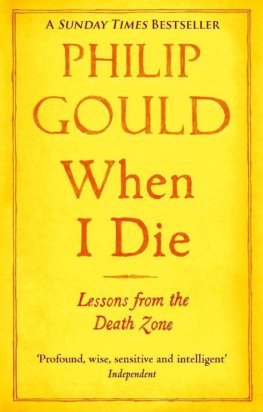
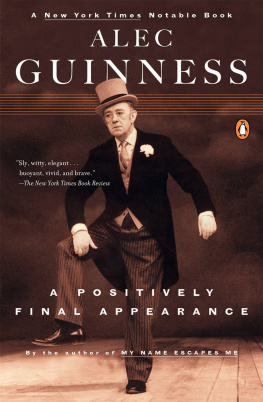
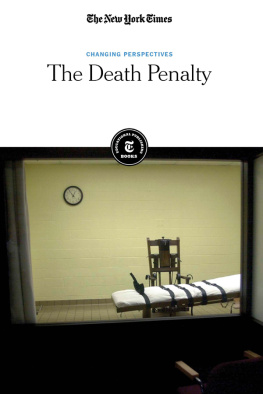
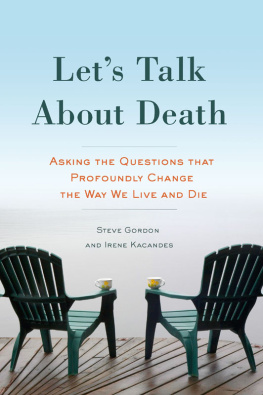
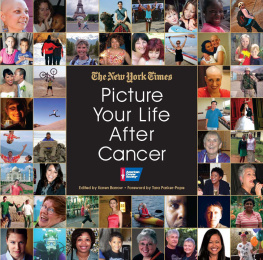
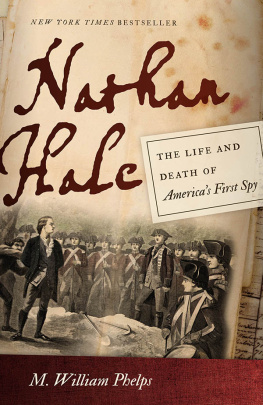
![Dworkin - Life and death : [unapologetic writings on the continuing war against women]](/uploads/posts/book/97794/thumbs/dworkin-life-and-death-unapologetic-writings.jpg)
